Liberty Seated Quarter
1838 to 1865 No Motto
1853 to 1855 Arrows
1866 to 1891 Motto
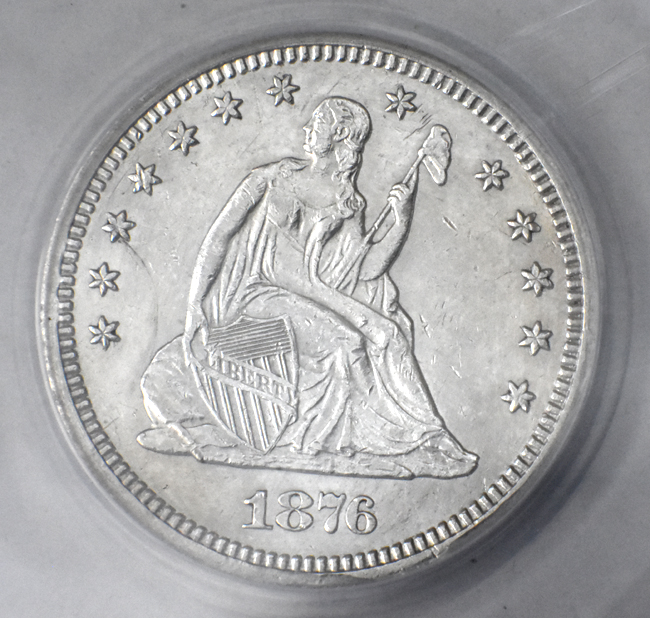 |
In 1838, the quarter was redesigned to display a seated liberty and to the eagle on the reverse was added the abbreviations QUAR. DOL. The silver content was raised slightly to 90% and the weight declined a tad to 6.68 grams. These coins were made at both Philadelphia and New Orleans. In 1853 arrows were placed at the date and in 1866 the words IN GOD WE TRUST were added to the reverse on a banner above the eagle. | 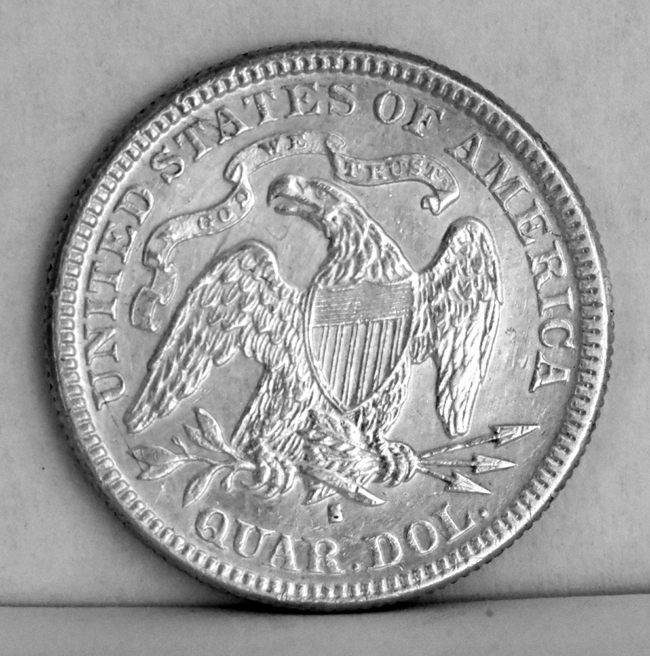 |
| The 1876 example above was sold as uncirculated but ANACS certified it as AU 58. It is stored in the D case and is worth about $250. This issue has the motto on the reverse above the eagle. I have another example of this variety of the coin dated 1891, stored in the U. S. Types album. | This is the reverse of the coin at left. In 1855 these quarters were minted also in San Francisco. | |
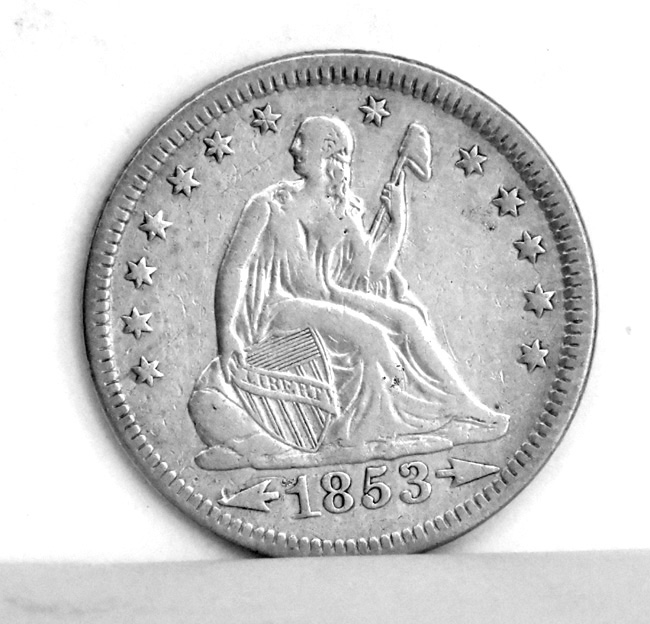 |
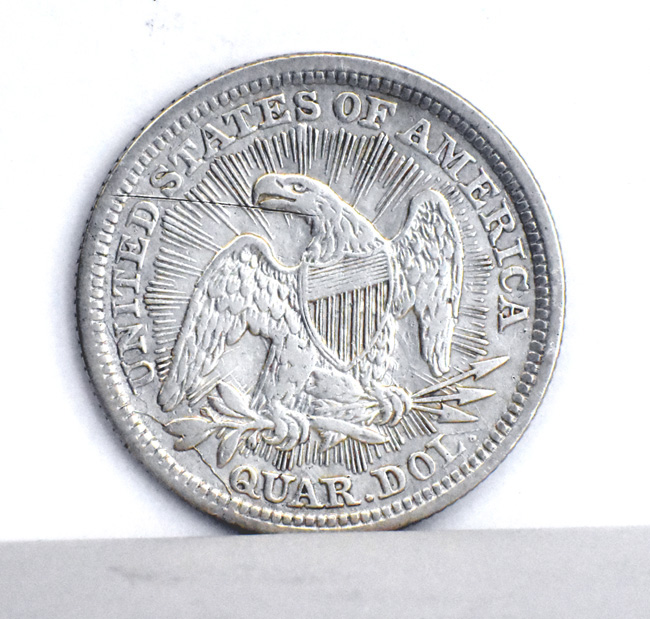 |
|
| The example above cost me $26.07 and is now worth about $50 although the scratch on the reverse may lower that value a bit. The U. S. Types album has a slot for each of the three varieties of this coin written above, and I have one of each in that album, including an 1861 with no motto, for which I paid $6 and is now worth $25, and an 1891 in XF with the motto, for which I paid $39 and is now worth about $65. | This is the reverse of the coin at left. Each variety hosts the same reverse except for the motto above the eagle and the rays around the eagle. The coin below was minted without the rays. | |
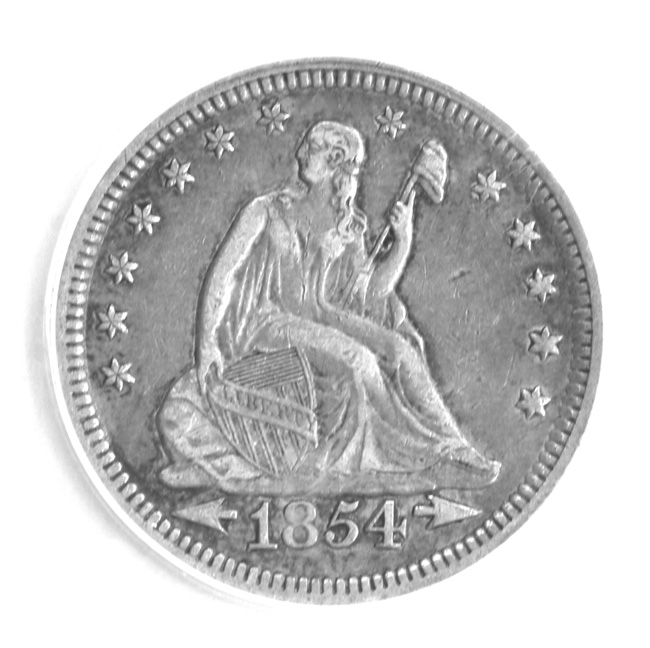 |
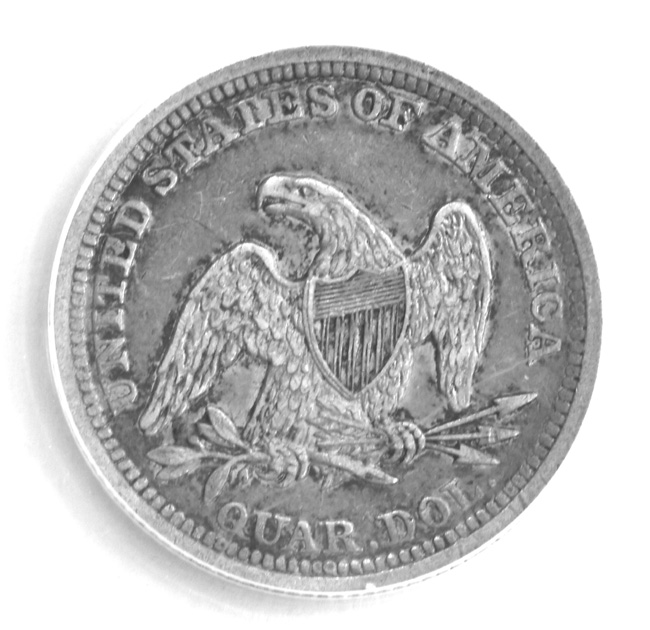 |
|
Although the coin with arrows on the obverse was changed again in 1854 with the removal of the rays, the arrows were retained through 1855. Thus in 1856 the arrows were removed but were added again in 1873. |
This is the reverse of the coin at left. |
| 1854: January 6: The fictional detective Sherlock Holmes is born. February 11: Major streets are lit by coal gas for the first time by the San Francisco Gas Company; 86 such lamps are turned on this evening in San Francisco, California. February 14: Texas is linked by telegraph with the rest of the United States, when a connection between New Orleans and Marshall, Texas is completed. February 28: The Republican Party is founded in Ripon, Wisconsin. May 30: The Kansas–Nebraska Act becomes law creating the Kansas Territory and the Nebraska Territory, west of the State of Missouri and the State of Iowa. July 6: In Jackson, Michigan, the first convention of the U.S. Republican Party is held. August 31- September 8: An epidemic of cholera in London kills over 10,000. Dr John Snow traces the source of one outbreak (that killed 500) to a single water pump, validating his theory that cholera is water-borne, and forming the starting point for epidemiology. November 14: Great Storm of 1854 in the Black Sea: 19 British transport and other ships (plus 2 French) supporting the Crimean War are wrecked with the loss of at least 287 men. December 8: Pope Pius IX in the apostolic constitution Ineffabilis Deus defines ex Cathedra the dogma of Immaculate Conception, which holds that the Blessed Virgin Mary was conceived without original sin. Exact date unknown: Ignacy Łukasiewicz drills the world's first oil well in Poland, in Bóbrka near Krosno County. Professor Benjamin Silliman of Yale University is the first person to fractionate petroleum into its individual components, by distillation. |
| 1876: March 7: Alexander Graham Bell is granted a patent for an invention he calls the telephone. March 10: Alexander Graham Bell makes the first successful call by saying "Mr. Watson, come here, I want to see you.." May 18: Wyatt Earp starts work in Dodge City, Kansas, serving under Marshal Larry Deger. June 4: The Transcontinental Express arrives in San Francisco, California via the First Transcontinental Railroad, 83 hours and 39 minutes after having left New York City. June 25: Battle of the Little Bighorn: an army under Lieutenant Colonel George Armstrong Custer is defeated by 1,500-2,500 Lakota, Cheyenne and Arapaho led by Sitting Bull and Crazy Horse, suffering over 300 casualties. August 1: Colorado is admitted to the union as the 38th U.S. state. August 2: Wild Bill Hickok is killed in a poker game in Deadwood, South Dakota. September 7: In Northfield, Minnesota, Jesse James and the James-Younger Gang attempt to rob the town's bank but are surrounded by an angry mob and are nearly wiped out. December 5: The Brooklyn Theater Fire kills at least 278, possibly more than 300. Date not known: Heinz Tomato Ketchup introduced. |